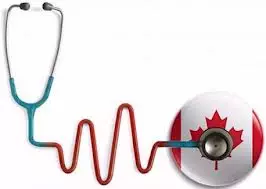
Credit: TopNews.in website
The Canadian Medical Association (CMA) released their 12th annual National Report Card on Health Care this week on August 13th. Surveys were conducted online and via telephone with 1004 randomly selected participants by the Ipsos Household Panel. Their findings confirm that one’s social state (living conditions, nutrition, access to health care) has a direct correlation to their overall health.
The report exposes Canadians opinions of the health care system, identifies gaps and needs, allows health care professionals to adopt techniques in their practice to address their client’s needs and acts as a continuous guide for all health care professionals.
Unlike the previous report cards, CMA asked questions pertaining to the social determinants of health. As defined by the World Health Organization, “the social determinants of health are the conditions in which people are born, grow, live, work and age, including the health system. These circumstances are shaped by the distribution of money, power and resources at global, national and local levels”.
The social determinants of health are pivotal in understanding an individual’s well being, especially as it pertains to income levels. This report concludes that those who are impoverished and earning $30,000 or less annually are susceptible to poorer health. As the saying goes, wealth = health.
Several key findings illustrate trends for those earning $30,000 or less:
- 36% rate income as a barrier to health compared to 17% earning $60,000 or more
- 50% do not eat the recommended five servings of fruits and vegetables a day
- Only 39% rate their health as excellent or good compared to 68% earning $60,000 or more; a 29% difference
- Individuals with low income are 52% less likely to participate in physical activity
- 6 out of 10, or 59% of lower income individuals, accessed health care services versus 43% in the $60,000 income bracket; a gap increase of 16% from 2009
At the annual CMA meeting taking place between August 12-15 in Yellowknife this year, topics up for discussion are the “need to develop clinical tools for physicians wishing to carry out health equity work in their practices” in order to make for a more equitable and efficient health care system. Furthermore, access to health care ranked 2nd as a top factor impacting an individual’s health following tobacco use and before nutrition.
Overall, the CMA has recorded the realities of the growing gap between the rich and the poor, indicating a need to alter its policies and practices. Like-minded professor and author of Poverty in Canada :Implications for Health and Quality of Life and The Canadian Facts Dennis Raphael, argues that one’s health is based on their living conditions and that poverty is a threat to the health care system. Evidence of the cost of poverty on health care system has been consistently produced by academics and think tanks such as the Canadian Centre for Policy Alternatives who reported on the cost of poverty in BC last year. Their findings show that the BC government alone could save $1.2 billion each year if they addressed the health issues of the poorest 20% of the population. Now imagine the savings that would stretch across the country…
Researchers, medical practitioners, advocates and academics are all sending out the same message: regardless of the quality of health care in Canada, the social determinants of health can not be overlooked. Let’s hope that governments across the country heed this advice.

